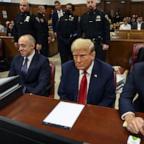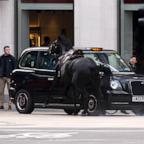Are Bishops Prepared to Address Problems?
W A S H I N G T O N, June 18 -- The U.S. Conference of Catholic Bishops convenes Thursday with reluctance, and even open resistance surrounding reforms adopted last year — and once again in the context of protests around the country .
In the wake of a notorious sex abuse scandal plaguing the Church, the U.S. Conference of Catholic Bishops adopted a groundbreaking new charter last year that promised to lift the veil of secrecy that was protecting hundreds of abusive priests.
One year later, the Church has made progress: an "audit" identifies non-compliant dioceses, and hundreds of accused priests have been suspended.
But the Church remains roiled by controversy, and fractured by accusations that some bishops have resisted fully implementing the new no-tolerance policy on sex abuse.
Before his resignation today, Phoenix, Ariz., Bishop Thomas O'Brien fought for months to avoid releasing Church documents to prosecutors investigating abuse allegations. Relenting two weeks ago, O'Brien signed an agreement admitting he kept known pedophile priests in positions with access to children — in exchange, he was granted immunity from prosecution.
Pope John Paul II accepted O'Brien's resignation a day after he was charged in a weekend hit-and-run accident unrelated to the sex abuse allegations.
Also this week, the National Review Board, an independent oversight panel of Catholic laity charged with monitoring the Church reforms, lost its leader. Board head Frank Keating, former governor of Oklahoma, resigned after a firestorm of criticism erupted over remarks he made comparing certain bishops' handling of the abuse scandal to the way the Mafia handles its legal problems. "To act like La Cosa Nostra," he told the Los Angeles Times last week, to "hide and suppress, I think, is very unhealthy."
Another member of the Review Board, attorney Robert Bennett, accused some U.S. bishops of acting "like risk assessment officers of insurance companies," more concerned with the cost of public disclosure than with shepherding the faithful through a difficult time in the history of the Church.




